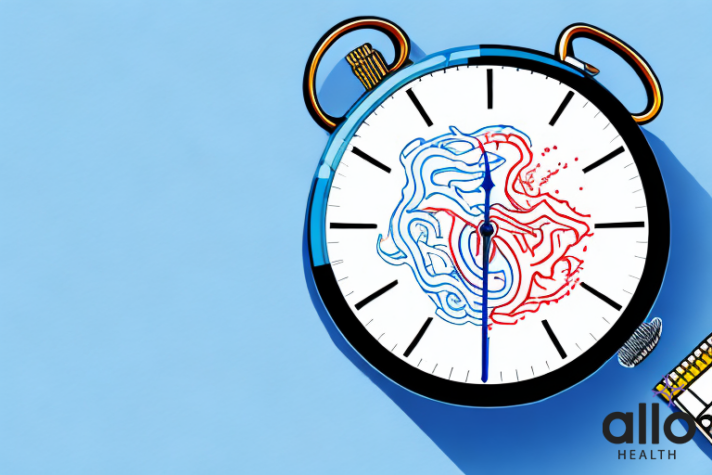Does Cialis Help With Premature Ejaculation?

Allo Health is dedicated to personalized well-being, offering support and trusted information tailored to individual health goals. The platform emphasizes human-generated content, led by a distinguished medical team of experts, including physicians and sexual health specialists. Their commitment to credibility involves rigorous fact-checking, authoritative research, and continuous updates to ensure accurate, up-to-date information. Allo Health's unique approach goes beyond conventional platforms, providing expert-led insights and a continuous commitment to excellence, with user feedback playing a crucial role in shaping the platform's authoritative voice.

Dr. Aditi completed her undergraduate medical education at AJIMS, Mangalore, after which she worked in multi-speciality hospitals with COVID patients and in the Pain and Palliative medicine department. Driven by her experiences, she developed a keen interest in psychiatry. Dr. Aditi believes that mental health is just as, if not more important, than physical health.
Why This Was Upated?
Our experts continually monitor the health and wellness space, and we update our articles when new information became available.
Updated on 04 February, 2024
- Article was updated as part of our commitment to diversity, equity, and inclusion.

"The following blog article provides information about a drug or brand name drug and its potential effects or benefits. However, it is crucial to understand that this information is intended for general educational purposes only and should not be considered a substitute for professional medical consultation. It is highly recommended to consult with a qualified healthcare professional before making any decisions regarding medication, treatment, or healthcare management.
Book consultation
Individuals have unique medical conditions, and the information provided in this article may not be applicable to everyone. Only a qualified healthcare provider can evaluate your specific medical situation, taking into account your medical history, conducting appropriate tests, and providing personalized advice and recommendations. They are equipped to make informed decisions tailored to your individual needs.
It is crucial to emphasize that self-diagnosis, self-medication, or disregarding medical advice can have serious health consequences. This article may reference specific brand names or drugs for illustrative purposes. Mention of these names does not imply endorsement, recommendation, or guarantee of their efficacy or safety. The choice of medication should be based on discussions and individualized guidance from a healthcare professional who has a comprehensive understanding of your medical condition.
"Premature ejaculation (PE) is a common sexual dysfunction that affects men of all ages. It is characterized by the inability to control ejaculation during sexual intercourse, leading to unsatisfactory sexual experience for both partners. Cialis, a medication widely prescribed for their erectile dysfunction (ED), has shown potential for treating PE. But, how effective is it exactly? In this article, we will explore the various aspects of Cialis in managing premature ejaculation and its alternatives.
What Is Cialis?
Cialis is a brand name for the generic drug tadalafil, which belongs to a class of medications known as phosphodiesterase type 5 (PDE5) inhibitors. It is primarily used to treat erectile dysfunction (ED) and symptoms of benign prostatic hyperplasia (BPH). Here are some key details about Cialis:
Mechanism of Action:
- Cialis works by inhibiting the enzyme phosphodiesterase type 5 (PDE5). This enzyme is involved in the degradation of cyclic guanosine monophosphate (cGMP), a chemical messenger that helps relax smooth muscle tissue in the penis.
- By inhibiting PDE5, Cialis increases the levels of cGMP, leading to the relaxation of smooth muscle cells in the blood vessels of the penis. This results in improved blood flow, helping to achieve and maintain an erection.
Dosage and Administration:
- Cialis is available in various strengths, including 2.5 mg, 5 mg, 10 mg, and 20 mg tablets.
- The recommended starting dose for most men with ED is 10 mg, taken as needed before sexual activity. The dosage can be adjusted based on individual response.
- For the treatment of BPH or a combination of BPH and ED, a daily dose of 5 mg is commonly prescribed.
Duration of Action: Cialis is often referred to as the “weekend pill” because its effects can last up to 36 hours. This extended duration of action provides a longer window of opportunity for sexual activity compared to some other ED medications.
Before starting Cialis, individuals should consult with their healthcare provider to discuss their medical history, current medications, and any potential contraindications.
It’s crucial to note that Cialis should be taken only under the supervision and prescription of a qualified healthcare professional. Self-medication or use without proper medical guidance can lead to adverse effects and complications.
Cialis Uses & Benefits
Cialis (tadalafil) has several uses and benefits, primarily related to its effectiveness in treating erectile dysfunction (ED) and symptoms of benign prostatic hyperplasia (BPH). Here are the details of Cialis uses and benefits:
Treatment of Erectile Dysfunction (ED):
- Improves Erection Quality: Cialis is primarily prescribed to men who experience difficulties in achieving or maintaining an erection sufficient for sexual activity. It works by increasing blood flow to the penis, facilitating the physiological processes that lead to an erection.
- On-Demand Treatment: Cialis is taken as needed, usually about 30 minutes before anticipated sexual activity. This flexibility allows for spontaneity compared to some other ED medications.
Management of Benign Prostatic Hyperplasia (BPH):
- Relief of BPH Symptoms: In addition to its use for ED, Cialis is approved for the treatment of BPH, a condition characterized by an enlarged prostate gland. By relaxing the smooth muscle in the prostate and bladder, Cialis helps to improve urinary symptoms associated with BPH, such as difficulty urinating, incomplete emptying of the bladder, and frequent urination.
- Combination Therapy: Cialis can be used alone or in combination with other medications, depending on the severity of BPH symptoms.
Treatment of BPH and Erectile Dysfunction (ED) Together:
- Simultaneous Relief: For men who have both BPH and ED, Cialis offers the advantage of addressing both conditions simultaneously. This dual action can be beneficial for overall sexual and urinary health.
Extended Duration of Action:
- Longer Window of Opportunity: One notable feature of Cialis is its extended duration of action, often referred to as the “weekend pill.” The effects can last up to 36 hours, allowing for a more extended period during which sexual activity can take place. This feature provides increased flexibility and spontaneity for couples.
Improvement in Quality of Life:
- Enhanced Sexual Function: By effectively treating ED, Cialis can contribute to improved sexual function and satisfaction, leading to an enhanced quality of life for individuals and their partners.
- Urinary Symptom Relief: For those with BPH, Cialis can alleviate bothersome urinary symptoms, leading to a better overall quality of life by reducing discomfort and inconvenience associated with urinary difficulties.
Psychological Benefits:
- Boost in Confidence: Successful treatment of ED with Cialis may lead to increased self-confidence and improved psychological well-being.
- Reduction of Anxiety: Knowing that an effective treatment is available can help reduce anxiety related to sexual performance.
It’s important to note that while Cialis can be highly effective, it should be used under the guidance of a healthcare professional, and individuals should follow the prescribed dosage and recommendations. Additionally, consultation with a healthcare provider is essential to determine the appropriateness of Cialis based on individual health conditions and potential interactions with other medications.

Cialis Side Effects & Precautions
Cialis (tadalafil) is generally well-tolerated, but like any medication, it may cause side effects in some individuals. It’s important to be aware of potential side effects and take precautions to ensure safe use. Here are details about Cialis side effects and precautions:
Common Side Effects:
- Headache: One of the most common side effects of Cialis is a headache. This side effect is usually mild to moderate and tends to resolve on its own.
- Indigestion (Dyspepsia): Some people may experience indigestion, characterized by discomfort or pain in the upper abdomen, bloating, and gas.
- Back Pain and Muscle Aches: Back pain and muscle aches can occur. These side effects are generally transient and diminish with time.
- Flushing: Cialis may cause facial flushing, which is a sensation of warmth and redness in the face and neck.
- Stuffy or Runny Nose: Nasal congestion or a runny nose can occur.
Less Common Side Effects:
- Dizziness: Some individuals may experience dizziness or lightheadedness, especially when standing up from a sitting or lying position.
- Vision Changes: Cialis has been associated with rare cases of changes in vision, including blurred vision and color vision changes.
Serious Side Effects (Rare, but may require immediate medical attention):
- Priapism: A prolonged and painful erection lasting more than four hours requires immediate medical attention. Priapism, if not treated promptly, can cause permanent damage to the penis.
- Sudden Hearing Loss: Although rare, sudden hearing loss has been reported in some individuals using PDE5 inhibitors like Cialis. Seek medical attention if sudden hearing loss occurs.
Precautions and Considerations:
- Nitrates and Alpha-Blockers: Cialis should not be taken with nitrates (commonly used for chest pain) or alpha-blockers (medications for high blood pressure and prostate concerns) as this can lead to a dangerous drop in blood pressure.
- Cardiovascular Health: Individuals with a history of cardiovascular disease, including heart concerns, should use Cialis with caution. A healthcare provider should assess the cardiovascular risk before prescribing.
- Liver and Kidney Function: People with liver or kidney concerns may need dosage adjustments, and Cialis should be used with caution in these cases.
- Other Medications: It’s crucial to inform the healthcare provider about all medications being taken, including prescription, over-the-counter, and herbal supplements, as some may interact with Cialis.
Special Populations:
- Elderly: Elderly individuals may be more sensitive to the effects of Cialis, and dosage adjustments may be necessary.
- Pregnancy and Breastfeeding: Cialis is not intended for use in women, and its safety during pregnancy and breastfeeding has not been established.
It’s essential to consult with a healthcare provider before starting Cialis to discuss any pre-existing medical conditions, medications being taken, and potential contraindications. Always follow the prescribed dosage and seek medical attention if any concerning side effects occur. Do not self-medicate or adjust the dosage without consulting a healthcare professional.
Cialis Drug Interactions
Cialis (tadalafil) can interact with various drugs, potentially leading to adverse effects or altering the effectiveness of either medication. It’s crucial to inform your healthcare provider about all the medications, supplements, and herbal products you are taking before starting Cialis. Here are some notable drug interactions with Cialis:
Nitrates:
- Concomitant use of Cialis with nitrates or nitric oxide donors (such as nitroglycerin) is contraindicated. Both Cialis and nitrates can cause a significant drop in blood pressure, leading to a life-threatening condition known as hypotension.
- Nitrates are commonly used to treat chest pain (angina), and combining them with Cialis can result in a dangerous interaction.
Alpha-Blockers:
- Cialis may enhance the hypotensive (blood pressure-lowering) effects of alpha-blockers, medications commonly used to treat high blood pressure and benign prostatic hyperplasia (BPH).
- The combination of Cialis with alpha-blockers can result in symptomatic hypotension, dizziness, or fainting.
Antihypertensive Medications:
- Combining Cialis with other antihypertensive medications may increase the risk of hypotension.
- Caution is needed when using Cialis alongside medications that lower blood pressure, such as beta-blockers and calcium channel blockers.
CYP3A4 Inhibitors:
- Cialis is metabolized by the hepatic enzyme CYP3A4. Drugs that inhibit this enzyme can increase the concentration of Cialis in the blood, potentially leading to an increased risk of side effects.
- Common CYP3A4 inhibitors include certain antifungal medications (ketoconazole, itraconazole), macrolide antibiotics (clarithromycin, erythromycin), and HIV protease inhibitors (ritonavir, saquinavir).
CYP3A4 Inducers:
- Drugs that induce CYP3A4 activity may reduce the effectiveness of Cialis by increasing its metabolism. Rifampin is an example of a CYP3A4 inducer.
- The combination of Cialis with CYP3A4 inducers should be used cautiously, and dosage adjustments may be necessary.
Other PDE5 Inhibitors:
- Concomitant use of multiple phosphodiesterase type 5 (PDE5) inhibitors, such as Cialis and sildenafil (Viagra), is generally not recommended due to the potential for additive effects and increased risk of side effects.
Grapefruit Juice:
- Grapefruit juice can inhibit the metabolism of Cialis, leading to increased blood levels of the medication.
- It’s advisable to avoid consuming grapefruit or grapefruit juice while taking Cialis.
Protease Inhibitors (for HIV):
- Protease inhibitors used in the treatment of HIV, such as ritonavir and saquinavir, can increase the concentration of Cialis in the blood, necessitating dosage adjustments.
It’s essential to consult with your healthcare provider to ensure safe use of Cialis, especially if you are taking other medications. Your doctor can assess potential drug interactions and adjust your treatment plan accordingly. Never self-adjust medication dosages or combinations without consulting a healthcare professional.

Does Cialis Help With Premature Ejaculation?
Cialis (tadalafil) is not specifically indicated for the treatment of premature ejaculation (PE). Its primary approved use is for the treatment of erectile dysfunction (ED) and symptoms of benign prostatic hyperplasia (BPH). However, there is some evidence suggesting that Cialis might have an impact on premature ejaculation to some extent, although it is not its primary purpose. Here are some considerations:
- Delayed Ejaculation: Some studies and anecdotal evidence suggest that Cialis may contribute to delaying ejaculation in some men. The mechanism for this effect is not fully understood, but it is thought to be related to the ability of Cialis to increase blood flow to the genital area, which might affect the ejaculatory process.
- Individual Variability: The response to Cialis can vary among individuals, and not everyone may experience a delay in ejaculation. Additionally, the effects on ejaculation are generally considered a side effect rather than a primary therapeutic outcome.
- Off-Label Use: Some healthcare providers may prescribe medications off-label for conditions not officially approved by regulatory agencies. However, any use of Cialis for premature ejaculation should be discussed thoroughly with a healthcare professional, and the risks and benefits should be carefully considered.
- Behavioral and Psychological Approaches: Premature ejaculation is often a multifactorial condition with psychological and behavioral components. Behavioral therapy, counseling, and specific techniques, such as the “stop-start” or “squeeze” method, are commonly recommended for managing premature ejaculation.
- Consultation with Healthcare Provider: If premature ejaculation is a concern, it is crucial to consult with a healthcare provider who can provide a comprehensive evaluation. They can assess potential underlying causes, such as anxiety or relationship concerns, and recommend appropriate interventions.
It’s important to note that medications like Cialis have potential side effects, and their use should be guided by a healthcare professional. The primary focus of Cialis is on erectile dysfunction, and its use for premature ejaculation is not part of the officially approved indications.
Individuals considering the use of Cialis for premature ejaculation should have an open and honest discussion with their healthcare provider to explore appropriate treatment options based on their specific circumstances and health status. Additionally, lifestyle modifications, psychotherapy, and other non-pharmacological approaches may be considered as part of a comprehensive treatment plan for premature ejaculation.
Treating Premature Ejaculation Caused By Cialis
Premature ejaculation caused by the use of Cialis (tadalafil) is a rare but reported phenomenon. If an individual experiences premature ejaculation as a side effect of Cialis, several approaches can be considered for managing this concern. It’s important to note that any adjustment to medication should be discussed with a healthcare professional, and self-adjustment or discontinuation without guidance is not recommended.
- Consult with Healthcare Provider: The first step is to consult with the prescribing healthcare provider. Open communication is crucial to understanding the nature of the premature ejaculation and determining the appropriate course of action.
- Adjust Cialis Dosage: Depending on individual response, the healthcare provider may consider adjusting the dosage of Cialis. This could involve reducing the dose or changing the frequency of use. However, any changes should be made under professional guidance.
- Consider Alternative Medications: If premature ejaculation persists, the healthcare provider may explore alternative medications for erectile dysfunction or other underlying conditions. Selective serotonin reuptake inhibitors (SSRIs) are one class of medications known to have a side effect of delaying ejaculation and may be considered.
- Psychological Counseling: Premature ejaculation can have psychological components. Counseling or therapy, either individually or with a partner, can address any anxiety, stress, or performance-related concerns contributing to premature ejaculation.
- Behavioral Techniques: Techniques such as the “stop-start” or “squeeze” method can be helpful in managing premature ejaculation. These approaches involve interrupting sexual activity to delay ejaculation and can be incorporated into a comprehensive treatment plan.
- Pause or Discontinue Cialis Use: In some cases, healthcare providers may recommend a temporary pause or discontinuation of Cialis to assess whether it is contributing to the premature ejaculation. This decision should be made in consultation with a healthcare professional.
- Address Underlying Factors: Identifying and addressing any underlying factors contributing to premature ejaculation, such as relationship concerns, stress, or performance anxiety, is crucial. A holistic approach that considers both physical and psychological aspects may be beneficial.
- Combination Therapy: In certain cases, a combination of pharmacological and non-pharmacological interventions may be recommended for optimal results. This may involve a tailored approach based on individual needs and preferences.
Individuals experiencing premature ejaculation associated with Cialis should not hesitate to seek professional guidance. Healthcare providers can assess the specific situation, consider alternative treatments, and provide personalized recommendations to address the concern effectively. Open communication and collaboration between the individual and healthcare provider are key to finding an appropriate solution.
Most Asked Questions
-
Can Cialis be used to treat premature ejaculation?
Cialis isn't always especially designed to deal with premature ejaculation. While some people may additionally revel in delayed ejaculation as a side effect, it is not its primary purpose. Behavioral and mental techniques are regularly recommended for managing premature ejaculation.
-
How does Cialis effect ejaculation?
Cialis is thought to persuade ejaculation via growing blood waft to the genital area, potentially delaying the ejaculatory system. However, man or woman responses range, and the outcomes on ejaculation are taken into consideration secondary to its primary use for erectile disorder and benign prostatic hyperplasia.
-
Is it safe to use Cialis off-label for premature ejaculation?
Using Cialis off-label for untimely ejaculation have to be mentioned with a healthcare company. While it could have some impact, capacity aspect effects and individual variability ought to be taken into consideration. Healthcare professionals can guide on the appropriateness of such use.
-
Are there different medicinal drugs in particular designed for premature ejaculation?
Yes, there are medications designed specifically for untimely ejaculation, such as selective serotonin reuptake inhibitors (SSRIs). These drugs were shown to have a nice impact on delaying ejaculation and are prescribed based on man or woman instances.
-
What non-pharmacological methods can assist with premature ejaculation?
Non-pharmacological techniques consist of behavioral remedy, counseling, and particular techniques just like the stop and start technique. These strategies cope with mental and behavioral elements of premature ejaculation and are often taken into consideration as a part of a complete treatment plan.






































